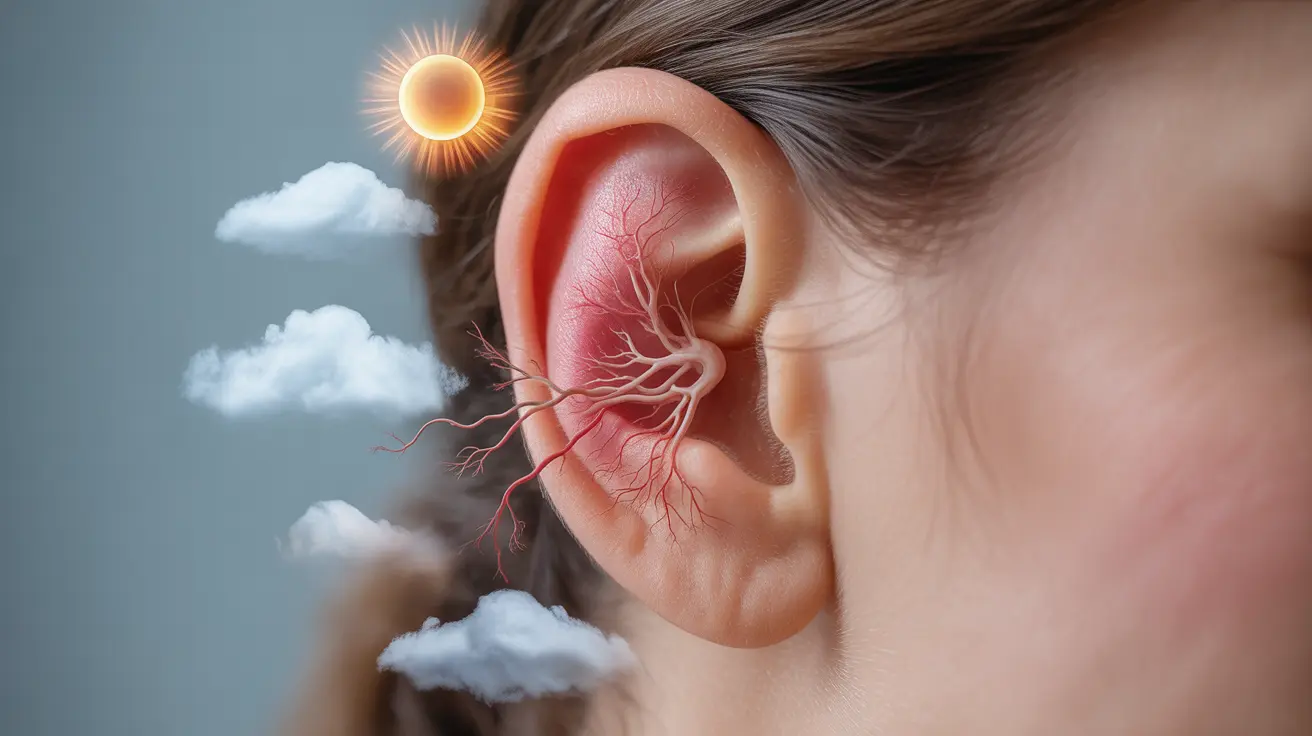Have you ever noticed your ears suddenly becoming red and hot for no apparent reason? This common phenomenon can be both uncomfortable and concerning. While red, warm ears often have harmless causes, understanding the various triggers and knowing when to seek medical attention is important for your peace of mind and health.
Let's explore the different reasons behind red and hot ears, from simple environmental factors to medical conditions that may require attention, along with effective solutions for managing this condition.
Common Causes of Red and Hot Ears
Temperature Changes and Environmental Factors
One of the most frequent reasons for red and hot ears is environmental exposure. Changes in temperature, particularly moving from cold to warm environments, can cause blood vessels in the ears to dilate, leading to redness and warmth. Additionally, sun exposure or extreme weather conditions can trigger this response.
Emotional Triggers
Strong emotions like embarrassment, anger, or anxiety can cause your ears to become red and hot. This reaction occurs due to the release of stress hormones that affect blood flow to the skin, including your ears. This response is typically temporary and resolves once you've calmed down.
Medical Conditions That Can Cause Red Ears
Red Ear Syndrome
This rare condition causes episodes of redness and burning in one or both ears. Episodes can last from a few minutes to several hours and may be triggered by touch, temperature changes, or stress. Some people experience associated symptoms like headaches or facial pain.
Allergic Reactions
Contact allergies to products like hair care items, jewelry, or headphones can cause local inflammation, resulting in red and hot ears. Identifying and avoiding the allergen usually resolves the issue.
Infections and Inflammation
Ear infections, particularly outer ear infections (swimmer's ear), can cause redness, warmth, and discomfort. Other inflammatory conditions affecting the skin or blood vessels may also contribute to red, hot ears.
Treatment and Prevention Strategies
Self-Care Measures
Several home remedies can help manage red and hot ears:
- Applying a cool compress to reduce inflammation
- Avoiding known triggers (certain foods, environmental factors)
- Using gentle, fragrance-free skin care products
- Protecting ears from sun exposure
- Managing stress through relaxation techniques
Medical Interventions
When self-care isn't enough, medical treatments may include:
- Antihistamines for allergy-related symptoms
- Anti-inflammatory medications
- Prescribed treatments for underlying conditions
- Topical treatments for skin irritation
When to Seek Medical Attention
Consult a healthcare provider if you experience:
- Persistent redness and heat lasting several days
- Severe pain or swelling
- Associated symptoms like fever or hearing changes
- Recurring episodes that impact daily life
- Signs of infection such as discharge or severe tenderness
Frequently Asked Questions
Why do my ears suddenly get red and hot without any pain or injury?
Sudden redness and heat in the ears without pain often results from vasodilation (widening of blood vessels) triggered by temperature changes, emotions, or hormonal fluctuations. This reaction is usually harmless and temporary.
What medical conditions can cause persistent red and hot ears along with pain or swelling?
Medical conditions that can cause these symptoms include Red Ear Syndrome, infections, allergic reactions, and inflammatory disorders. Persistent symptoms with pain or swelling warrant medical evaluation.
How can emotional stress or temperature changes lead to red and warm ears?
Stress triggers the release of hormones that affect blood vessel dilation, while temperature changes cause blood vessels to expand or contract to regulate body temperature. Both mechanisms can result in red, warm ears.
When should I see a doctor for red and hot ears that do not go away?
Seek medical attention if symptoms persist for several days, are accompanied by severe pain, swelling, fever, or hearing changes, or if the condition significantly impacts your daily activities.
What are effective ways to prevent or treat red and hot ears caused by sun exposure or irritation?
Prevent and treat sun-related or irritation-induced symptoms by using sun protection, avoiding known irritants, applying cool compresses, and using gentle, non-irritating skin care products. If symptoms persist, consult a healthcare provider.




